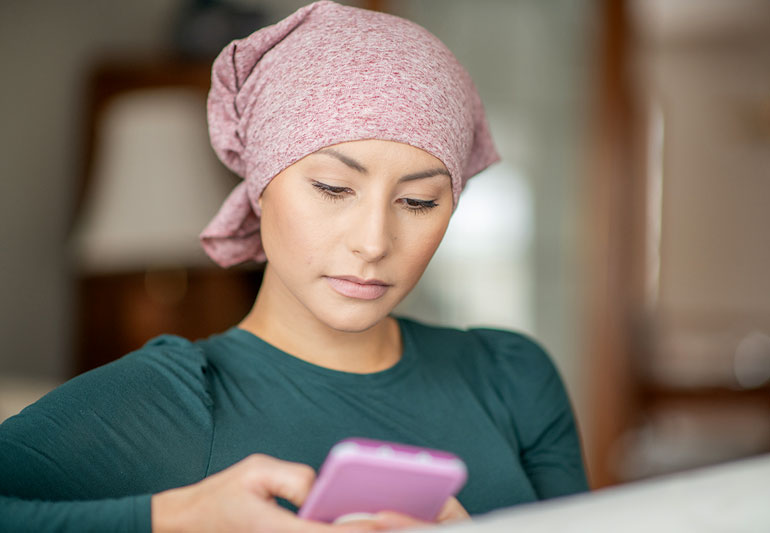

It can be hard to know what to say or how to act when someone you know and love has cancer. Maybe it’s your spouse, a coworker or a neighbor. But no matter what, it’s important to say and do the right things in order to offer support to the person.
Cancer care nurse Josette Snyder, RN, MSN, AOCN, says there is such a thing as “cancer etiquette.”
Cancer etiquette is interacting with someone with cancer in friendly, empathetic and appropriate ways. It’s showing that you acknowledge what he or she is going through — both physically and emotionally. It’s the awareness that cancer can affect everything in that person’s life.
You should respect, too, that everyone responds differently to events and experiences. People may not respond the way you would — and that’s OK. Accepting this can go a long way in talking with and helping someone you care about who has cancer.
Here’s what to keep in mind.
Cancer Etiquette: Do’s
- Do be connected. Simply be there for the person. You don’t have to fill spaces with talk. Your physical presence lets them know you’re there. Silence is OK too if you don’t know what to say.
- Do listen actively. Give them your full attention and make full eye contact. Never judge what they say, just listen. It often helps to summarize back what they say to be clear and show you’re on the same page.
- Do help them restore a sense of control in their lives. Encourage them to return to doing the things they enjoy, which can help them get back some of the things they feel they lost. Their world has changed. If it’s possible, it can make all the difference to return to familiar routines — driving, exercising, doing chores or shopping.
- Do apologize if you say something wrong. At one point you’ll likely put your foot in your mouth, which you may sense right away. Or the person may tell you. If so, simply apologize, humbly and without defensiveness.
- Do imagine trading places. How would you like to be treated if you had cancer? You’d likely want to be treated as you always have been — you’re the same person, after all. You’d like people to not patronize you, but you need them to acknowledge the reality and sometimes the pain and stress of your situation and treat you with empathy and compassion. You’d want them to listen.
Cancer etiquette: Don’ts
- Don’t say “I know exactly how you feel” or compare them to other people you know who’ve had cancer. Every situation is different, so you can’t know what they’re dealing with. Their reactions to chemotherapy and other treatment are their own. Saying this negates what they’re feeling and puts the focus on you.
- Don’t just tell them “you look great!” as this well-intentioned remark may only negate their feelings. They may be struggling inside and not feel great at all. And don’t say, “You’ve really lost weight” in an effort to make them feel good. People going through cancer treatment want to maintain their weight.
- Don’t say “God never gives you more than you can handle.” You don’t always know where other people are spiritual. You’re imposing your belief system and values on them. That makes it about you, not them.
- Don’t tell — ask. Ask them what they need and how you can help. Don’t tell them what you’re going to do to help. Empower them to make the decision, another way to help them restore some control into their lives.
more recommended stories
 Safer Allogeneic Stem Cell Transplants with Treg Therapy
Safer Allogeneic Stem Cell Transplants with Treg TherapyA new preclinical study from the.
 Autoimmune Disorders: ADA2 as a Therapeutic Target
Autoimmune Disorders: ADA2 as a Therapeutic TargetAdenosine deaminase 2 (ADA2) has emerged.
 Kaempferol: A Breakthrough in Allergy Management
Kaempferol: A Breakthrough in Allergy ManagementKaempferol, a dietary flavonoid found in.
 Early Milk Cereal Drinks May Spur Infant Weight Gain
Early Milk Cereal Drinks May Spur Infant Weight GainNew research published in Acta Paediatrica.
 TaVNS: A Breakthrough for Chronic Insomnia Treatment
TaVNS: A Breakthrough for Chronic Insomnia TreatmentA recent study conducted by the.
 First-of-Its-Kind Gene-Edited Pig Kidney: Towana’s New Life
First-of-Its-Kind Gene-Edited Pig Kidney: Towana’s New LifeSurgeons at NYU Langone Health have.
 Just-in-Time Training Improves Success & Patient Safety
Just-in-Time Training Improves Success & Patient SafetyA study published in The BMJ.
 ChatGPT Excels in Medical Summaries, Lacks Field-Specific Relevance
ChatGPT Excels in Medical Summaries, Lacks Field-Specific RelevanceIn a recent study published in.
 Study finds automated decision minimizes high-risk medicine combinations in ICU patients
Study finds automated decision minimizes high-risk medicine combinations in ICU patientsA multicenter study coordinated by Amsterdam.
 Study Discovers Connection Between Omicron Infection and Brain Structure Changes in Men
Study Discovers Connection Between Omicron Infection and Brain Structure Changes in MenA recent study in the JAMA.

Leave a Comment